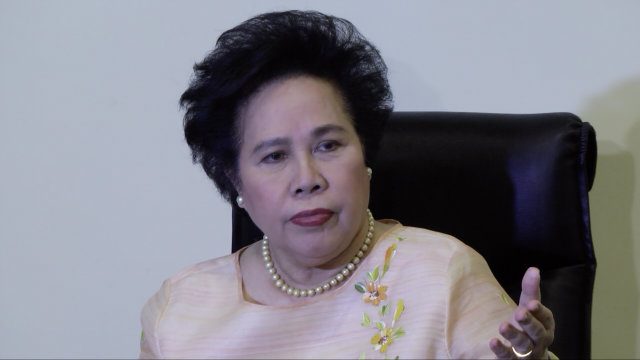SUMMARY
This is AI generated summarization, which may have errors. For context, always refer to the full article.

MANILA, Philippines – It has become Senator Miriam Santiago v. Vice President Jejomar Binay.
It was an event sponsored by the Catholics for Reproductive Health, but Senator Miriam Santiago veered her topic towards the end of her speech to slam Binay’s refusal to attend the Senate probe on the alleged overpriced Makati City Hall II Parking Building.
Binay’s strategy to resort to speeches to respond to the allegations, she said, is tantamount to forum shopping.
“In the cascade of corruption cases that have fallen on the heads of the hapless Filipino people, the most spectacular are the plunder and allied charges against Vice-President Jejomar Binay,” Santiago began the section of the speech titled, “The Curious Case of the Taciturn Vice-President.”
Short of declaring Binay guilty of the allegations against him by former Makati vice mayor Ernesto Mercado, the former trial lawyer cited 6 Supreme Court rulings that scoff at the silence of the accused.
“The presumption of innocence means only that it is the prosecution which bears the burden of proof. Once the prosecution has presented evidence, then it becomes the obligation of the respondent to present his evidence. After hearing both sides, then the tribunal makes a decision based on the evidence,” Santiago said.
Vice President Binay dismissed the probe of the Senate Blue Ribbon Subcommittee as pre-judged and politically motivated while his son, Makati Mayor Erwin Jejomar Binay, challenged the jurisdiction of the subcommittee but was junked for lack of merit.
Santiago said Binay cannot and should not evade the jurisdiction of the Senate for this simple reason: “If the VP has truth to tell, what is he afraid of?”
She added: “Binay appears to be content in defending himself by delivering speeches accusing his enemies of lying. That is not sufficient. He must present his own evidence.”
Santiago explained how the ruling of the High Court in 7 cases work against Binay’s reasoning in skipping the Senate probe.
She cited the following as jurisprudence to support the Senate jurisdiction over the Makati building probe:
Dela Paz v. Senate Committee on Foreign Relations
“The Supreme Court upheld the Senate Rules which authorize the Blue Ribbon Committee and other Senate committees to conduct investigation on all matters relating to misbehavior by officers in all government branches. This power to conduct public hearing covers “any matter of public interest on its own initiative or brought to its attention by any of its members.”
Morero v. Bocar
“This provision has been traditionally construed as a grant of full discretionary authority to the Houses of Congress in the formulation, adoption and promulgation of its own rules. As such, the exercise of this power is generally exempted from judicial supervision and interference, except on a clear showing of such arbitrary and improvident use of the power as will constitute a denial of due process.”
Senate Blue Ribbon Committee v. Majaducon
“The Supreme Court merely quoted the Constitution, Article 6, Section 21, and logically upheld the authority of the Senate committees to conduct inquiries in aid of legislation.”
On Binay’s chosen “silence” to address the allegations against him at the Senate hearing, Santiago, cited the following cases:
Bertulfo v. Nuñez
“The respondent was accused of gross dishonesty. Although ordered repeatedly by the court to submit his comment or explanation, respondent just kept silent. Hence, the Supreme Court said: “To us, respondent is not at all interested in clearing his name or simply has nothing to say in his defense.””
Grefaldeo v. Judge Lacson
“The natural instinct of man compels him to resist an unfounded claim or imputation and defend himself. It is totally against our human nature to just remain reticent and say nothing in the face of false accusations. Hence, silence in such cases is almost always construed as implied admission of the truth…. Silence gives consent.”
People v. Villanueva
“As between a categorical testimony that rings of truth on one hand, and a bare denial on the other, the former is generally held to prevail. A mere denial, like alibi, is inherently a weak defense and constitutes self-serving negative evidence which cannot be accorded greater evidentiary weight than the declaration of credible witnesses who testify on affirmative matters.”
The Senate probe has branched out from the alleged overpriced Makati building to other corruption allegations including the Binays’ alleged ownership of a 350-hectare in Batangas farm reportedly valued at P1.2 billion. (READ: Mrs Binay’s royal taste? ‘Kew Gardens,’ aircon piggery)
Santiago also cited the Philippine Daily Inquirer story on the alleged kickbacks from 10 infrastructure projects amounting to P4 billion between 1999 and 2014.
“With all of these accusations aired on news media and particularly in the social media, the silence of Mr Binay and his lawyer to present counter-evidence is alarming,” Santiago said. – Rappler.com
Add a comment
How does this make you feel?
There are no comments yet. Add your comment to start the conversation.